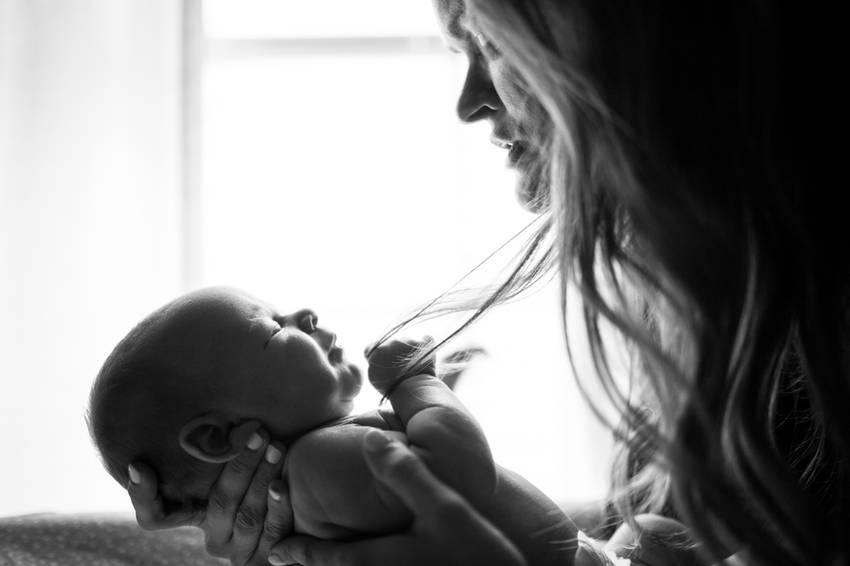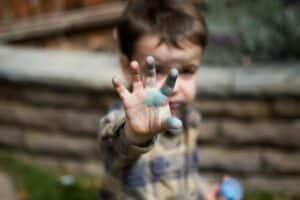Do you have a baby sucking bottom lip? This is a common behavior that usually starts at around 4-6 months old. In this blog post, we will discuss the reasons behind baby lip-sucking and offer some tips on how to help your child stop doing it.

Signs Of Your Baby Sucking The Bottom Lip
Bottom Lip Sucking Baby
The most apparent indication is if you observe your infant sucking their bottom lip. They’ll have their lip in their mouth and will suck on them. You could see that your baby does this for a few seconds while they’re waiting to be fed; it just lasts a couple of seconds.
Bottom Lip Bump or Bruise
If you notice a bruise on or around your baby’s lips that isn’t explained, they may be sucking on it. Their sucking will leave a bruise over time. The initial color of the mark will be red, then, after some time, purple.
Why Do Babies Bite Their Lips?
Self-soothing
Babies instinctively use different methods to self-soothe, and biting their lower lip is one of them. Some newborns suck their thumbs for fun in the womb. Their hands are more difficult to reach once they are born, so they suck on their bottom lip, which they can reach much more easily.
Teething
Teething is typically a stressful period for both parents and their children. While most babies begin drooling and exploring their mouths at 3 months old, their first teeth do not appear until they are about 6 months old.
Normally, the lower front teeth are the first to develop. As a result, your infant will draw their bottom lip to alleviate discomfort or pain in their lower gums.
Hunger
When it comes to hunger, not all babies cry. You might notice your baby sucking bottom lip like it’s nursing, especially when it’s nearing time for its next feed. Don’t be alarmed if your infant does this more often than usual during a growth spurt, which occurs between the ages of 4 and 6 months.

Practice
Your infant may be learning how to utilize their mouth for eating as part of typical childhood development and growth. A recessed chin can be a potential reason.
How To Treat Lip Inflammation?
Lip Balm For Newborns
If you’re unsure whether to invest in one of each type, talk with your pediatrician about what options are available.
Natural Oils
Coconut oil, in particular, can assist in curing an itch by preventing the saliva from contacting the afflicted skin.
Is Your Baby Suffering From Dermatophagia?
Dermatophagia is a psychological illness in which people compulsively bite their skin, especially their fingertips, and hands. Sometimes you may notice lip quivering as well. If you’re concerned that your child may have dermatophagia, talk to their doctor.
Does Baby Sucking Bottom Lip Influence Their Development?
Dental Concerns
Overbites can also be caused by continuously sucking the lower lip. The upper lip and teeth overlap the lower teeth beyond normal when the lower lip is continually sucked. This may lead to chewing problems in the long run. In severe situations, if the misalignment causes the lower teeth to come into contact with the upper gum line, potential gum harm may occur.
Speech Issues
If your infant continues to do this after he or she reaches one year old, speech issues may develop. This might necessitate extensive speech treatment.
How To Stop Your Baby From Biting His Or Her Lower Lip?
Prepare ahead of time for when they’re going through a growth spurt, especially if it’s due to fussy eating.
Pacifier
Pacifiers help newborns reconnect to their pre-existence. This is an excellent technique to soothe your infant while also satisfying his sucking reflex.
Teething Remedies
If the baby is older than six months, offer him or her some ice water. Teething gels and silicone necklaces should be avoided because the FDA considers them hazardous.

Distraction
Offer them other activities such as playtime with their favorite toys or watching cartoons with plenty of dancing and singing.
Other Important Baby Cues
• She appears to be dozing off. Yawning is a common occurrence.
• Taking her eyes off the individual she was communicating with or the toy she was playing with.
•She turns her head the other way.
•Squirming and arching her back.
Frequently Asked Questions
Q1: Can a 3 month old be teething?
Ans: Yes, because some infants begin teething as early as two months.
Q2: Do babies develop blisters on their lips while breastfeeding?
Ans: The answer is a resounding yes. Some blisters, usually on the inner side of their lips, can be caused by the sucking action of nursing babies.
Q3: Is it possible for a three-month-old to sit up?
Ans: The age at which a baby sits up is similarly unpredictable, just as teething. However, by the time they are three years old, only a small percentage of individuals sit alone. Instead, they usually sit with the aid of someone for between 3 and 5 months.
Q4: Do 4 months or 5 months old babies suck bottom lip?
Ans: Babies at this age may start to suck their bottom lips when they are tired, hungry, or need comfort. However, it is not considered a teething symptom.
Q5: What does it mean when a baby presses lips together?
Ans: It means that your baby is hungry. Some other signs of hunger are also rooting and putting their hands to their mouth.
Conclusion
If your baby is sucking the bottom lip, don’t worry too much about it. However, if you’re concerned about speech delays or your baby’s teeth, consult your pediatrician. There are a few things you can do to help stop the behavior, such as feeding them on time and offering a pacifier.
If teething is the cause, try giving them ice water or using other teething remedies. Lastly, keep in mind that some babies just need to be distracted by other activities. If you have any concerns, please feel free to ask your pediatrician.







